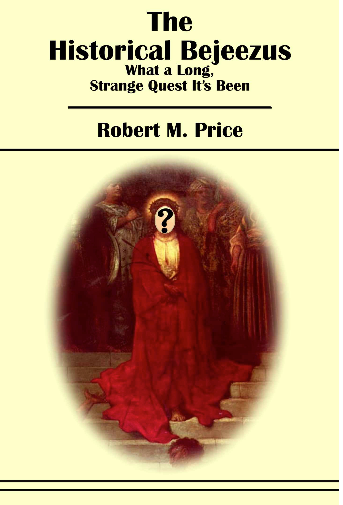 In my previous post I made the following note:
In my previous post I made the following note:
Daniel Gullotta has a more conventional background and approach and recently reviewed Robert Price’s latest volume, Review: The Historical Bejeezus: What a Long, Strange Quest It’s Been. He gives 2 out of 5 stars.
Daniel Gullotta expresses his disappointment over Price giving as much space as he does to some of the more bizarre (and generally obscured from the wider public’s consciousness) Christ myth theories extant today:
Some of these people [reviewed by Price] are household names to Bible geeks, such as John Dominic Crossan, Luke Timothy Johnson, and James D. Tabor, but others are for more obscure and less known. This is where the main problem lies with The Historical Bejeezus.
Some of the writers and theories that Price tackles are simply so minor, so fringe, and so insignificant it is hard to imagine why Price wasted his time and energy writing on them. Some of the chapters that were extremely difficult to finish were the ones related to the works of Hugh J. Schonfield, Joseph Atwill, and Charlotte Allen. . . .
[D]espite the outlandish claims of Atwill’s conspiracy theory about the origins of Christianity and Price’s own criticisms of Atwill’s work, Price nonetheless calls Atwill “an innovative thinker” and says that Atwill’s theory “does not sound unreasonable on the face of it.”
By contrast, writes Gullotta,
Even Richard Carrier is willing to distant himself from figures like Atwill and Murdoch with far more hard hitting reviews and criticisms, despite their shared overall thesis.
I think I can understand where both Gullotta and Carrier are coming from but I also think it is worth taking note of Price’s own explanation for why he “wasted his time” with such “fringe” authors. From Price’s Introduction:
I take quite seriously even works considered eccentric by the (often dull) mainstream of conventional scholarship. It is only by taking such books seriously, rather than offering facile mockery and disdain, that one can tell the difference between nonsense and brilliant new theories. But I have no wish to defend nonsense, and my book’s title pretty well indicates that I find a good bit of it in several of the books I review. And, again, it is my job to show why they are nonsense if indeed they are. . . . (My bolding) Continue reading “Robert Price’s New Book: A Comment”
